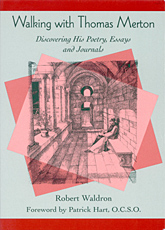Robert Waldron taught English in secondary schools for thirty-one years and is the recipient of four fellowships from the National Endowment for the Humanities. Two of his previous books focused on Thomas Merton: Thomas Merton in Search of His Soul and Poetry As Prayer: Thomas Merton. This paperback consists of entries Waldron made in his journal while he was preparing for a Merton retreat at St. Stephen Priory in Dover, Massachusetts.
The author considers this sensitive, industrious, and versatile Trappist monk to be his spiritual mentor. He is quite taken with what he calls Merton’s “utter truthfulness.” At one point, Waldron refers to the contemplative’s entire opus as “ a word icon,” directing a countless number of people to a deeper and truer relationship with God.
A major theme in Merton’s writings is attention. He describes it as “arduous as weight-lifting, but the more we do it, the easier it gets. It is a matter of will and exercise.” Another theme is his understanding of reading as a spiritual practice. Merton never felt alone when he was surrounded by all his books. He was able to find spiritual sustenance in such diverse sources as the poetry of Chuang Tzu or William Faulkner’s The Bear. A final theme in Waldron’s evaluation of this Christian pathfinder is his fascination with contemplation. Here’s just one of the hundreds of definitions Merton gave in his writings: “Contemplation is essentially a listening in silence.”
Near the end of the book, Waldron refers to James Laughlin, Merton’s poetry publisher who put together The Asian Journal. He finds it fitting that Merton’s most powerful mystical experience came through his ecumenism and not in the isolation of a Catholic monastery. It happened while standing before the Buddhas of Polonnaruwa in Ceylon.
Waldron’s enthusiasm for Merton’s value as a spiritual mentor is vividly conveyed in this succinct and illuminating assessment of his poetry, essays, and journals.
